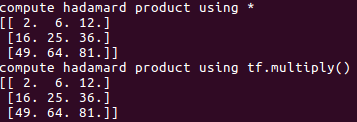In tensorflow, to compute Hadamard Product is very simple, you can use * operator or tf.multiply() function to do.
In this tutorial, we will tell me some details on computing Hadamard Product in TensorFlow.
Example 1: Compute hadamard product on the smae shape of two tensors
import tensorflow as tf
import numpy as np
# the shape of matrix a and b are the same
matrix_a = tf.constant([[1,2,3],[4,5,6],[7,8,9]], dtype=tf.float32)
matrix_b = tf.constant([[2,3,4],[4,5,6],[7,8,9]], dtype=tf.float32)
matrix_c = matrix_a * matrix_b
matrix_d = tf.multiply(matrix_a,matrix_b)
init = tf.global_variables_initializer()
init_local = tf.local_variables_initializer()
with tf.Session() as sess:
sess.run([init, init_local])
np.set_printoptions(precision=4, suppress=True)
c, d= (sess.run([matrix_c, matrix_d]))
print 'compute hadamard product using *'
print c
print 'compute hadamard product using tf.multiply()'
print dThe output is:

From the output in terminal, you will find * operator or tf.multiply() is the same.
However, if the shape of two matrix a and b are not the same.
Example 2: Compute hadamard product on the different shape of two tensors
import tensorflow as tf
import numpy as np
matrix_b = tf.constant([[2,3,4],[4,5,6],[7,8,9]], dtype=tf.float32)
matrix_e = matrix_a = tf.constant([[[1,2,3],[4,5,6],[7,8,9]], [[1,2,3],[4,5,6],[7,8,9]]], dtype=tf.float32)
matrix_f = matrix_e * matrix_b
init = tf.global_variables_initializer()
init_local = tf.local_variables_initializer()
with tf.Session() as sess:
sess.run([init, init_local])
np.set_printoptions(precision=4, suppress=True)
f= (sess.run([matrix_f]))
print 'compute hadamard product on shape [2,3,3] and [3,3]'
print fThe output is:

From the output, you will find tensorflow will compute hadamard product of two tensors on the last axis, so you must be sure the last two dimensions of two tensors are same.